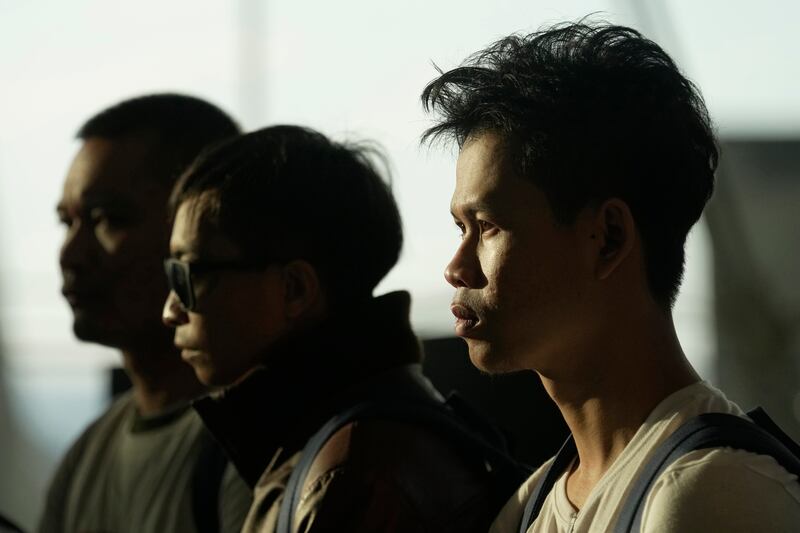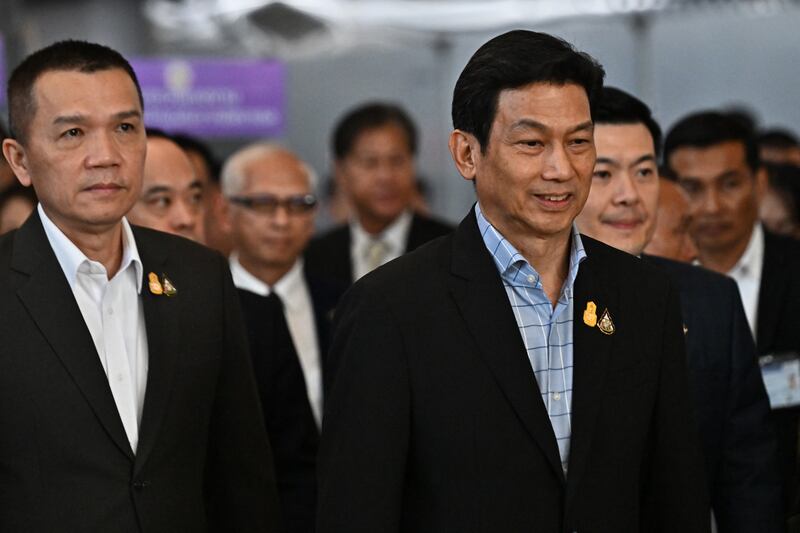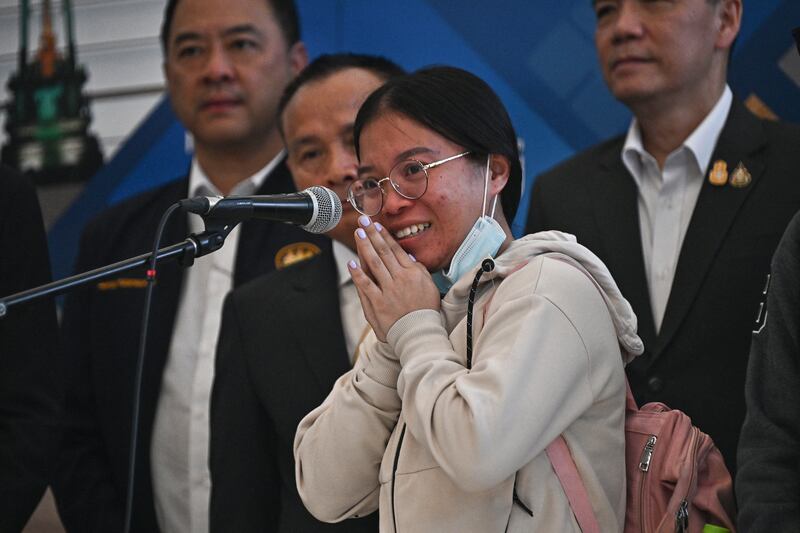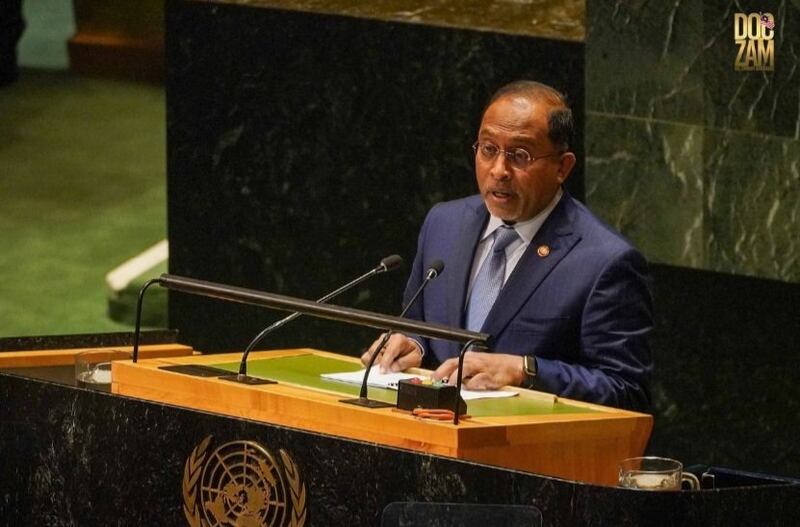Seventeen Thais freed by Hamas returned home Thursday to a joyous welcome from their families even as they mourned dozens of compatriots killed in the fighting that followed the Palestinian group’s deadly attack on Israel in early October.
They were the first group of ex-Thai hostages to return home. Six more freed Thais were in an Israeli hospital undergoing medical check-ups, and nine were still being held by Hamas, who captured 240 people and took them to Gaza as prisoners after the Oct. 7 attack.
The 17 arrived at the Suvarnabhumi Airport in Bangkok while their families waited anxiously in a room there to welcome them.
Pornsawan Pinakalo, 30, ran to his father, Kong Panasudlamai, as soon as he spotted him, and fell to his knees, before the two hugged and cried.
“Now I’m most happy in my life. I am lost for words, but I would be happier if none of my fellow workers had died,” Pornsawan said to the media gathered at the airport.
Another freed hostage, Uthai Sangnual, was in tears and called for a moment of silence in honor of the 39 fellow Thais who were killed either in the Hamas attack or in the fighting that followed between Israel and the Palestinian militant group. As many as 1,200 people, mostly Israeli civilians, were killed in the Oct. 7 attack.
“I’d like to convey my deepest condolences to our fallen 39 compatriots,” Uthai said, after which all gathered to greet the freed hostages bowed and stayed quiet for a minute.
After the moment of silence, Uthai said: “I congratulate all of my fellow Thai laborers who made it safe here.”
The Thais were abducted from agricultural areas in southern Israel after Hamas broke through a fence sealing off the Gaza Strip from the Jewish state.
Some 30,000 Thais were estimated to work in Israel before the conflict began, mostly in the agricultural sector. About a third of them have chosen to return to Thailand since Oct. 7. And around 8,500 Thai nationals have been repatriated from Israel since then.

Thai Foreign Minister Parnpree Bahiddha-Nukara, who flew to Israel to meet with released Thai hostages earlier this week, accompanied this first group of ex-hostages on their homeward trip, and said he shared their feelings.
“When I met with the 17 Thai nationals who were recently released, my joy was overwhelming and so was my relief,” Parnpree told reporters.
“It was a relief to see that they were happy and that they could smile and it was a moment that was emotional for me.”
He added that “the support of friends and allies helped secure the release of the Thai hostages,” and the government would continue its efforts to secure the release of those who remained captive, the Reuters news agency reported.
Following the attack by Hamas on Oct. 7, Parnpree visited Qatar and Egypt and met his Iranian counterpart Hossein Amir-Abdollahian to press for the release of the Thai nationals, who were the single largest group of foreigners abducted by Palestinian militants.
And Malaysian Prime Minister Anwar Ibrahim also helped, according to Thai Prime Minister Srettha Thavisin.
The Thai PM expressed his gratitude to Anwar when the Malaysian PM visited Thailand for a day on Nov. 27.
“I told him that we just did our utmost best in our efforts to bring back the hostages but it is the wisdom of Hamas and Egypt that paves the way for them,” Anwar told reporters.

Meanwhile, the Thai PM gave the freed hostages a virtual welcome at the airport.
“Throughout the period since October 7, all Thai people have been concerned about all of you, given moral support, and tried to do our best. I’m happy that today you returned to Thailand,” Srettha said, according to local news website Khaosod English.
The prime minister also inquired about how the freed hostages were treated when they were held captive and asked about whether they had any idea where the remaining nine who are still being held by Hamas might be.
“We really don’t know their whereabouts,” Uthai said.
“[Hamas] treated us okay. Quite good.”
In a statement, the Thai PM said the extension of the truce on Thursday, when it was set to end, was a “good sign” and called for the complete cessation of violence.
Israel and Hamas on Thursday agreed to extend the truce by another day, the foreign ministry of Qatar, which has been mediating between the two sides, said in a statement.
The extension would be on the same terms as the truce that first began on Nov. 24 and was subsequently extended, “which are a cessation of all military activities and the entry of humanitarian aid to Gaza.”
Additionally, under the terms, at least 10 Israelis a day, as well people from other nations, have been released during the truce, in exchange for Israel’s release of at least 30 Palestinian prisoners, the Associated Press reported.
West Bank ‘settler violence’ condemned at UNSC
A day earlier, the United Nations Security Council held a meeting on the Middle East crisis, with the top diplomat of China – the current chair of the 15-member body – calling for an immediate ceasefire of Israel-Hamas hostilities.
“[L]etting the fighting drag on would only bring more death and damage,” China’s Foreign Minister Wang Yi said in his statement to the Security Council.
“[R]esumed fighting would only most likely turn into a calamity that devours the whole region.”
He also said that protection of civilians “is a red line in international law that cannot be crossed” and any action that violates international law, in particular international humanitarian law, “should be condemned.”
Israel’s air and ground attacks on Gaza after the Hamas strike have killed more than 15,000 Palestinians, almost all civilians, according to the Palestinian enclave’s health ministry.
The Israeli attacks have also destroyed civic infrastructure and crippled hospitals, leaving Gaza in the midst of a dire humanitarian crisis, U.N. officials have warned.
Top diplomats of Arab and majority-Muslim countries had met with Wang in Beijing earlier this month as part of a globe-trotting itinerary during which the ministers planned to visit with officials of all five permanent members of the United Nations Security Council.
In addition to China, the Arab and Muslim nations’ aim was to convince permanent members the United States, Russia, France and Britain to coax Israel into ending hostilities in Gaza.
The U.S., Israel’s closest ally, has led a bloc of Western countries in resisting international and U.N. calls for a ceasefire, with Washington’s envoy to the world body vetoing or voting against official resolutions on this question.

At the Security Council on Wednesday, Linda Thomas-Greenfieled, the American ambassador to the United Nations, had not changed that position.
“We want to see this humanitarian pause extended,” she said in her statement.
But the U.S. and Israel don’t want a ceasefire, claiming that would enable Hamas to regroup and commit more attacks.
The fact that some Security Council members are refusing to condemn the Oct. 7 attack is “outrageous” and “unacceptable,” Thomas-Greenfield said.
She also mentioned that the United States was “deeply troubled by the sharp rise in violence by extremist Israeli settlers against Palestinians in the West Bank.”
Permanent member France agreed that the council must condemn the Oct. 7 attack, but went a step further on the West bank issue.
“France condemns the violence in the West Bank by settlers against Palestinians. This has claimed the lives of numerous Palestinian civilians,” said French Ambassador to the U.N. Nicolas de Rivière.
Unlike the U.S., though, he called on Israel to “immediately halt this violence,” adding that the truce must become a ceasefire.

The top diplomats of Southeast Asian nations Indonesia and Malaysia – both of which don’t have diplomatic relations with Israel and have not condemned Hamas – also attended the Security Council meeting in New York as part of the Muslim and Arab countries’ push to bring about a ceasefire in Gaza.
Indonesian Foreign Minister Retno Marsudi said the humanitarian pause was “too narrow and fragile” and wouldn’t enable a better situation in Gaza.
“Indonesia is increasingly very concerned with the evolving situation in the West Bank with the increasing number of attacks on the Palestinians, including refugee camps. …, I want to repeat what I’ve said last month in this room, that the UNSC has a big responsibility to maintain peace and security,” she told the body.
“The council must ensure that the hostilities do not return with a vengeance and work together to go beyond the humanitarian pause into a durable ceasefire.”
Malaysian Foreign Minister Zambry Abdul Kadir, similarly, said his country called on the council “to hear the resounding cry of concerned citizens of the world” who have been demanding a ceasefire.
“Too much time has been wasted and too many innocent lives have been lost. The whole world is looking and counting on the U.N., especially the Security Council,” he told the 15-member top U.N. group.
“This body has failed for Palestinians too many times and for far too long. It is time to deliver.”
Ili Shazwani in Kuala Lumpur, and Nani Yusof and Ika Inggas in Washington, contributed to this report.
